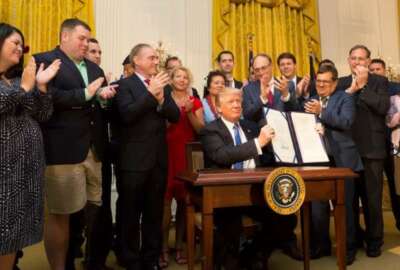

Democrats and Republicans are united on the need for change at the Office of Accountability and Whistleblower Protection, but they don't yet agree on how best t...
The House Veterans Affairs Committee is discussing improvements for VA’s Office of Accountability and Whistleblower Protection (OAWP), following years of complaints about the organization’s performance from employees, oversight groups and members of Congress.
OAWP, which the previous administration established back in 2017 and Congress codified into law a year later, has consistently struggled to earn trust from VA employees and members of Congress.
VA’s inspector general has said a culture of retaliation exists within the department, and despite attempts by leadership, the accountability office often failed to protect whistleblowers and misinterpreted its statutory functions.
Democrats and Republicans on the House committee, however, seem united on the need for change, even if they don’t yet agree on the specifics for a forthcoming bill.
The House VA Oversight and Investigations Subcommittee met Wednesday to discuss 14 bills, including two that offered different takes on how best to improve the accountability office.
“While well-intentioned, I think time has shown that the office is duplicative and not serving the true needs of whistleblowers,” Rep. Tracey Mann (R-Kan.), ranking member of the oversight and investigations subcommittee, said during Wednesday’s legislative hearing. “With an annual budget of around $22 million, OAWP has cost taxpayers roughly $90 million in its four years of existence and has not returned anywhere near that value with its work.”
Members will hold a hearing next month on whistleblowers and VA’s accountability office, said Rep. Chris Pappas (D-N.H.), subcommittee’s chairman. The House committee will also host a hearing on diversity and inclusion initiatives at VA in early May.
“Obviously whistleblowers are essential to the department,” Pappas said. “They’re vital for bringing to light waste, fraud and abuse, and it’s essential that we have a VA that’s safe and welcoming for all and that whistleblowers will have their rights protected. The two bills may address the issue from different angles, but I know that Ranking Member Mann and I share the same goal, that’s an OAWP that’s trustworthy and good for veterans and the department.”
Pappas’ bill, the Strengthening VA Whistleblower Protection Act, would establish a general counsel within OAWP itself. This entity would be independent from the general counsel within VA’s central office, and the legislation prohibits OAWP employees from discussing ongoing cases with the department’s counsel.
It also bans VA general counsel employees from joining OAWP for at least two years after their employment.
The department has a history of bringing in former general counsel officials to OAWP, including Hansel Cordeiro, the current acting director at the VA accountability office.
The Project on Government Oversight said this measure would “close a revolving door between the agency and OAWP.”
“This would help the OAWP become more independent and would remove many conflicts it currently faces due to working with the VA Office of General Counsel,” Melissa Wasser, POGO policy counsel, said in a written statement on the legislation. “Even VA employees have reported improper coordination between OAWP and the VA Office of General Counsel. OAWP’s independence from the agency is of great importance because it would help ensure an unbiased view of allegations and would help to better protect whistleblowers and hold agency officials accountable for misconduct.”
Pappas’ bill also attempts to add more protections and assurances for senior executives and would require OAWP to work more closely with whistleblowers on their cases.
Committee Republicans are working on a second bill, which, notably, would eliminate OAWP’s statutory authority to investigate allegations of senior leader misconduct and poor performance, as well as certain whistleblower retaliation complaints.
VA instead would transfer those complaints, as well as funding needed to investigate them, to the Office of Special Counsel. OSC routinely handles more cases from VA than any other federal agency, according to annual reports.
VA employees today have multiple channels to report whistleblower retaliation, including OAWP and OSC. The department’s inspector general and other oversight groups have said employees don’t often know where to go to make their disclosures.
“It’s one thing to have overlap in bureaucracies, it’s another to have overlap to the point of actually limiting the ability of each of the offices to function,” Rep. Jack Bergman (R-Mich.) said.
The Government Accountability Project said Congress could adopt the reforms detailed in the two bills, because both sets of changes are needed. It also cast doubt on OSC’s capacity to take on more work from VA, arguing cases already take years because special counsel investigators are overwhelmed.
VA itself hasn’t taken a position on either one of the bills, though it did say it was willing to work with Congress on a path forward.
“The administration supports legislative action that provides OAWP more autonomy to perform its critical statutory functions in an unbiased manner,” Jeffrey Mayo, VA’s acting assistant secretary for human resources and administration, operations, security and preparedness, said in his written statement.
In response to questions about transferring OAWP’s investigative authority, the department said VA’s accountability office had made meaningful changes in recent months.
“We take the independence of our investigations seriously. We approach investigations in an unbiased fashion,” said Cordeiro, the acting OAWP director. “We have undergone substantive changes over the last 12 months, and we have results to show for it. In the last year effectively, we have issued 98 recommendations, [including] 39 disciplinary recommendations for senior leader misconduct, 29 disciplinary recommendations for VA supervisors for whistleblower retaliations and 30 non-disciplinary recommendations.”
In a report to Congress last summer, the VA accountability office said it recommended disciplinary action against six senior leaders for misconduct and one supervisor for whistleblower retaliation during an 18-month period. The office reviewed thousands of complaints.
Beyond the two bills on OAWP improvements, the committee is also considering legislation to give the VA inspector general subpoena power over former employees and contractors.
Both VA and its inspector general are supportive of the bill. Chris Wilber, counsel to the inspector general, said the legislation would allow the department to speak to employees and contractors who had left VA and aren’t currently required to sit for investigative interviews after departing government.
Wilber noted several previous IG investigations where it would have been helpful to speak to former VA officials.
Copyright © 2024 Federal News Network. All rights reserved. This website is not intended for users located within the European Economic Area.
Nicole Ogrysko is a reporter for Federal News Network focusing on the federal workforce and federal pay and benefits.
Follow @nogryskoWFED

 Exclusive
Exclusive 